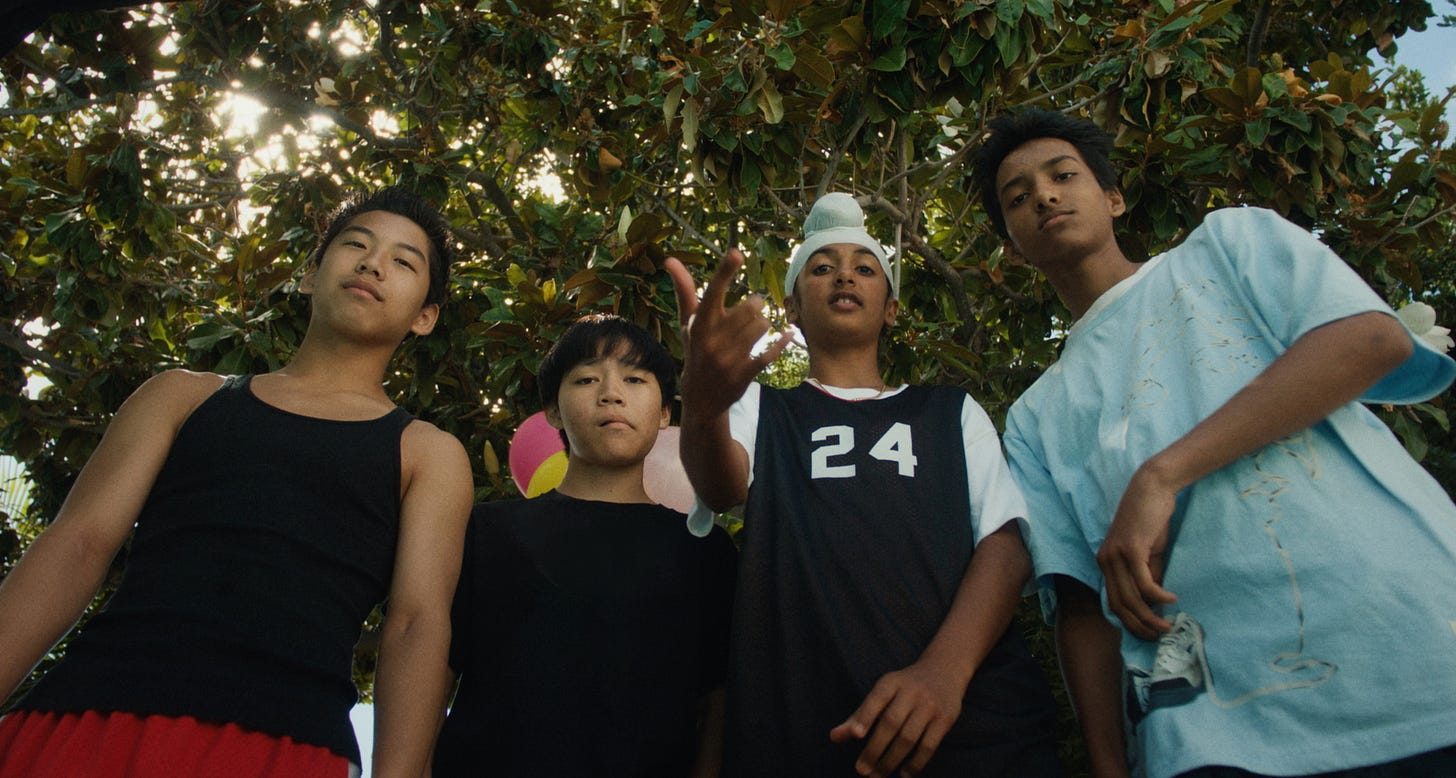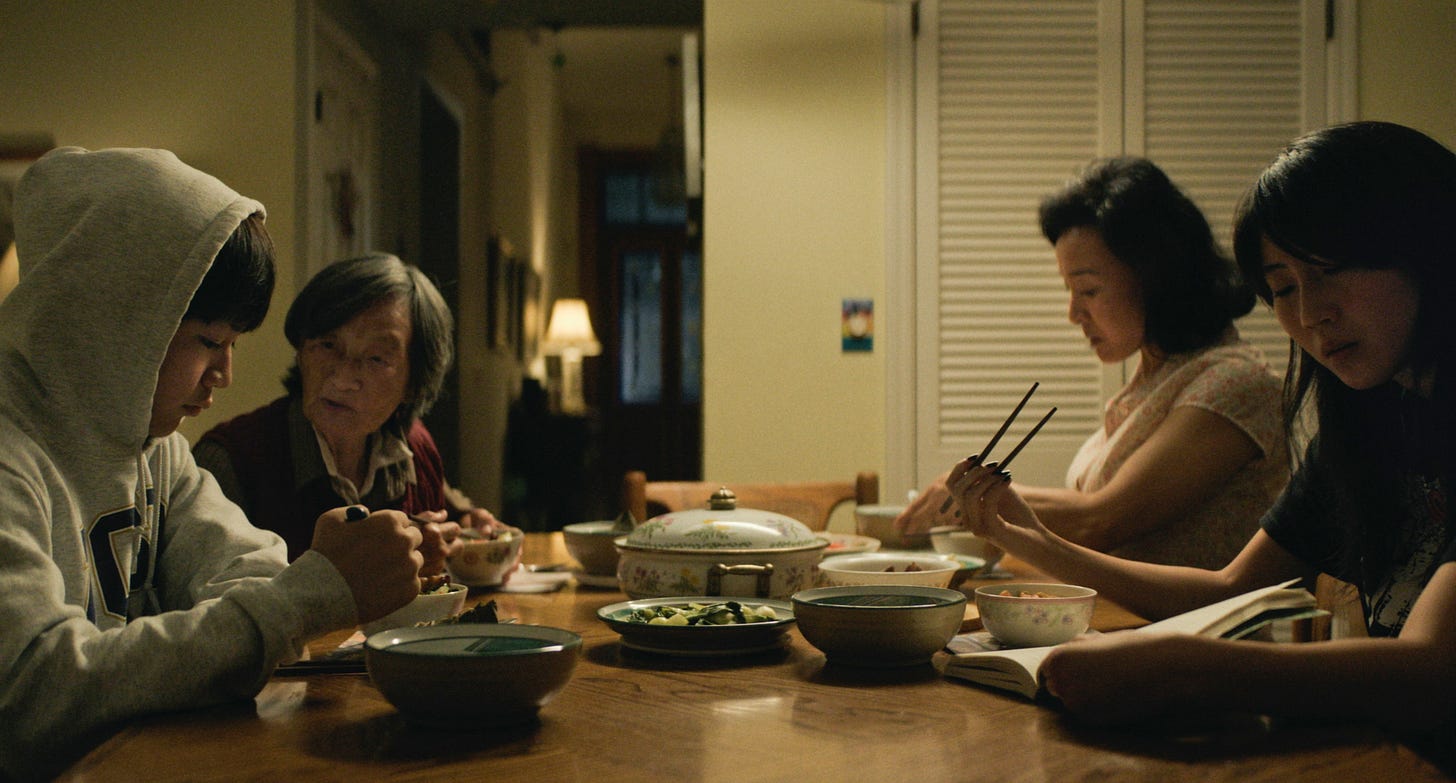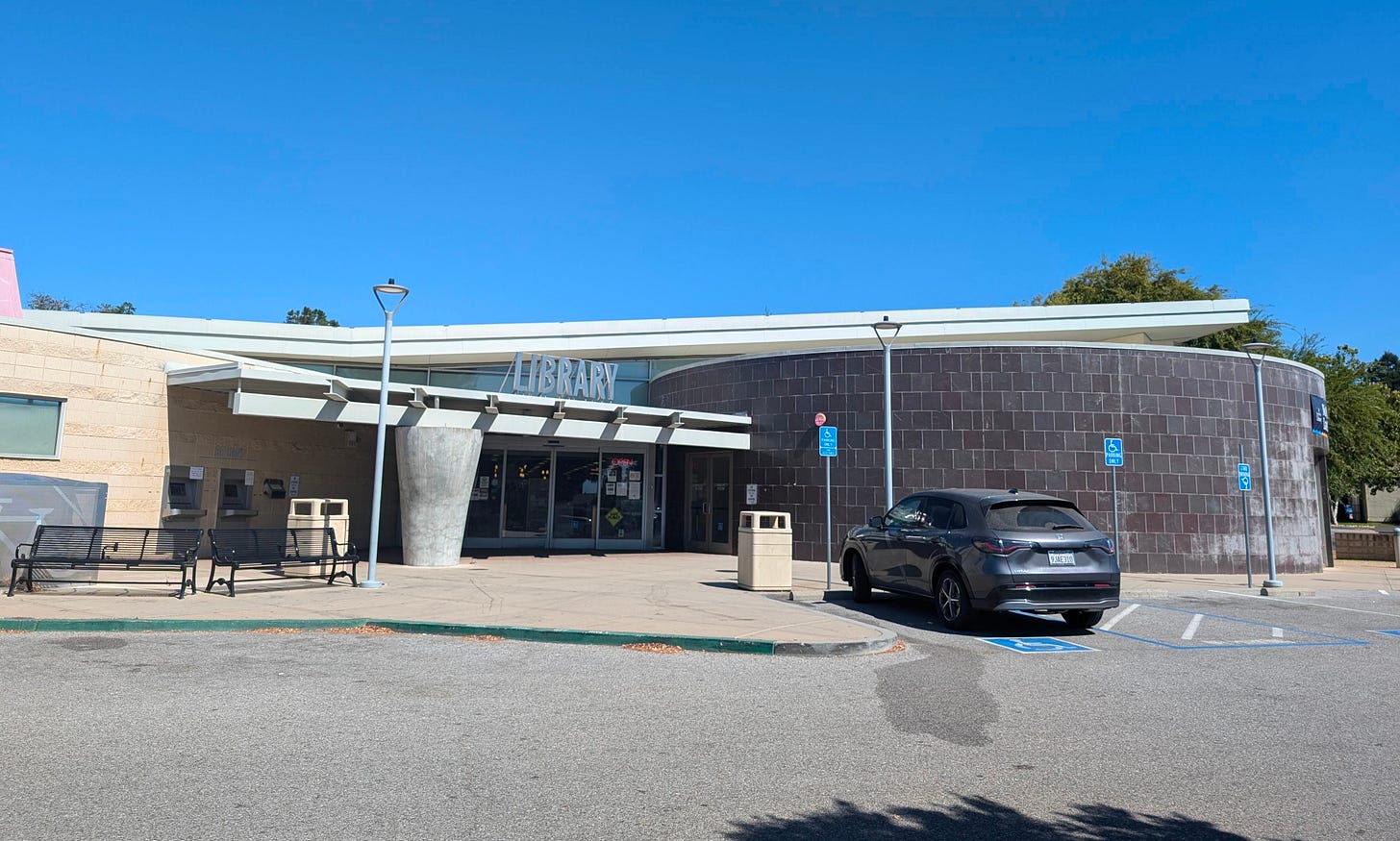I'm In This Movie and I Don't Like It
On Dìdi, this year's Big Asian American Movie.
Once a year, it seems, the Asian Americans get one big movie that gets our whole community excited, especially among the non-cinephiles. This trend started in 2018 with Crazy Rich Asians, a harbinger of increased Asian representation within American popular culture. Two other studio projects got a similar level of buzz, with a Marvel movie (Shang-Chi) and (to a lesser degree) an R-rated comedy (Joy Ride) being seen as “important,” whatever that means. Otherwise, it has been films like The Farewell, Minari, and Past Lives that become the Big Asian Movie of the Year: personal, low-budget productions that premiered at Sundance and were acquired by A24. That’s not to say there hasn’t been more than one good movie per year made by an Asian American, but for whatever reason, only one really crosses over into the mainstream.
(The one Big Asian Movie that splits the difference between multiplex and arthouse is Everything Everywhere All at Once. It is heartfelt and distributed by A24, but styled like a superhero movie, having been produced by Anthony and Joe Russo, who directed the last two Avengers flicks. And, like Shang-Chi and Crazy Rich, it stars Michelle Yeoh.)
This year, there’s just one contender for the title of Big Asian Movie. Dìdi is a personal coming of age tale from California native Sean Wang, which takes after films like The Farewell1. It won the Audience Award at this year’s Sundance Film Festival and was released by Focus Features in July, where it did an okay amount of business at the box office ($4.4 million domestic) and peaked at 435 theaters2. More people will see it now that it’s been released on VOD platforms (and it’ll eventually stream on Peacock).
Taking place during the summer of 2008, the protagonist, named Chris, is thirteen years old, which is the same age that I was in that year. I grew up in San Jose, which is roughly thirty minutes away from Fremont, where this film takes place. Chris and I (and, presumably, the character’s creator) have much in common. Nearly all of our peers were fellow Asians, we both listened to emo music, and we both wanted to be skater bois. There’s an inherent universality to a film that’s about growing up; it’s one of the few experiences that everyone reading this has been through. The film’s poster is a yearbook headshot of Chris, and it’s captioned “for anyone who has ever been a teenager.” And if you squint (pun intended), maybe you’ll see yourself on that poster. But I’m this teenager.
With most of these big Asian American movies, I find a lot that parallels my own experiences. Dìdi is different. People often talk about “being seen” by works of fiction, but this felt more like putting my memories directly onto a cinema screen3. It was disorienting to watch a movie that so directly reflected my own childhood: if you wanted to know what my world was like when I was thirteen, you can just watch this movie. The world of this film is completely accurate to my memory. Nearly every line of dialogue said by the kids in this film is something I’ve said, or something I’ve heard someone say — even the things that have not aged well. (If anything, Wang holds back a little bit.)
Other viewers of my generation, even if they didn’t grow up Asian in the Bay Area, will still identify with how rapidly the internet became an integral part of the social fabric4. Who among us hadn’t spent endless nights on the computer, scrolling through MySpace and chatting with crushes on AIM, learning how to kiss by watching a YouTube video, fussing over whether to end a message with a :) or a :p?
But there is so much about this movie that is specifically about being a barely pubescent Asian in this specific time and place5. In a time just before Asians became “cool” in pop culture, Chris has a desire to be seen as white and not yellow, going as far as to claim he’s mixed race. (We were very similar, but not the same: I never lied about my ethnicity.) But because of Fremont’s demographics, there’s no “lunchbox moment” where he’s bullied for bringing Asian food to school6. This is a place where an Asian kid would made fun of if he brought an egg salad sandwich instead of ramen. (That actually happened to me.)
During a post-screening Q&A, Wang compared his movie to other personal coming of age stories like Beginners, 20th Century Women, and Lady Bird. These films left him wondering “where life ends and the movie begins.” I tried to find that threshold with Dìdi, to figure out how I would feel if it wasn’t such a reflection of my early teenage years. If you took out the references to Live 105, that scene at the Golfland in Milpitas, and the clips of early-stage Azn YouTube… what’s left?
Perhaps it’s a fool’s errand to try to divorce a film’s story from its setting. As the Vice-President says, we exist in the context of all in which we live, etc. I’m probably harder on Dìdi than I am with other films because I know this story so well, and sort of take it for granted. (Call it the peril of being seen yellow.) Judged solely by its craft, it’s a solid movie that’s elevated by its acting performances. The script is tightly structured, and there’s a clear thematic focus on shame and self-hatred. Wang paces the film to keep things moving along, serving its story above all, but that’s to the detriment of its cinema. I would have liked to see a movie that’s looser and as messy as its protagonist’s emotional state.
What does make the script interesting is that the young Chris isn’t a particularly likable underdog. He rejects the people close to him, out of a sense of shame that he can’t yet quite articulate. He rewrites his AIM messages until he wipes away all traces of vulnerability. He lashes out at his lovely mom in front of his friends. Repressing your emotions can lead to violent outbursts like that.
The actors are doing great work, and Wang and his casting directors did a terrific job of filling every role. Izaac Wang (no relation) is terrific as that moody Chris, and Joan Chen, who plays his mother, is trusted to communicate her character’s arc without many scenes that are exclusively about her. In a cute bit of meta-casting, Wang’s real-life grandmother, Chang Li Hua, appears in several scenes, playing a much meaner version of the woman we saw in Nǎi Nai & Wài Pó, Wang’s lovely documentary about his two grandmas. And all the kids in the ensemble bring a nonchalant, easygoing mood that comes with growing up as an Asian person surrounded by other Asians.
Wang films his hometown of Fremont without much sentiment, with cinematographer Sean Davis depicting the city as the drab suburb that it is. It’s impossible to give Fremont any romance, with its brown, drought-stricken hills and endless tract houses, and the exterior scenes are remarkable for just how boring it looks. Neither are the indoors given a warm nostalgia. Scenes set inside Chris’s home are always a bit too dark, as if his mom is trying to save money on electricity by keeping the lights off. Even with this rationalization, I found the visual direction of this film uninspiring.
With one big exception: the “screenlife” shots throughout the movie, where we get a Chris’s eye view of his online activities. Seeing everything that he sees online, we know more about Chris than any other character in this film. Instead of interior narration, we see him typing out his feelings, only to delete them and replace it with a terse remark. The screen lives of millennials have never been more elegantly bared. The Facebook pages and AIM windows are perfectly rendered, in part due to editor Arielle Zakowski’s previous experience working on Missing, which entirely takes place through a computer screen7. Not only do we see what Chris is doing, we feel his presence in front of the monitor. We hear him quietly inhale and exhale as he waits for a girl to message him back. The “handheld” camera pans across the screen, which keeps the shot visually dynamic while focusing our attention. These little things lend humanity to digital interfaces: it’s not bigwang510 using the computer, it’s Chris Wang.
Although we had very similar upbringings — myself, the fictional Chris, the director Sean Wang — our lives diverged by the start of high school, which is where this movie ends. Chris becomes a legit skater, whereas I could barely ollie. Wang has become a rising talent, last year snagging an Oscar nomination for Nǎi Nai & Wài Pó and garnering critical acclaim with Dìdi. My creative platform is this little-read Substack.
This film has the misfortune of being made during what seems like the tail end of a trend. These Sundance coming of age dramas are getting stale. But Wang has demonstrated a keen understanding of character and story that should serve him well in his future projects. I’m really curious what his second movie will be. Will he stay in this lane of making grounded, personal indies, or will he take the paths of Lee Isaac Chung and Greta Gerwig and work on massive blockbusters like Twisters and Barbie?
I saw this movie roughly six weeks ago, as part of the New York Asian Film Festival, and since then I’ve struggled to write a coherent review. (I’m not saying I succeeded!) I just got back from visiting the Bay, which I called home for eighteen years. Because neither of my parents live in my old neighborhood anymore, I don’t usually go to any of the places that were meaningful to me as a kid. This time around, for whatever reason, I ended up going to some of my old haunts. I reveled in all the Vietnamese groceries at Maxim Market, where people speak to me in a language I’m supposed to understand. I walked through the library on Aborn Road, where at the age of three I first learned the concept of disappointment. (It’s a core memory: my mom drove me there only to discover that the library was closed on Sundays. I was very sad.)
It was an uncanny feeling, walking through these places that appeared to be largely unchanged, but maybe they have changed. I wouldn’t know; I haven’t been around. It was the same queasy nostalgia I felt while watching Dìdi.


Lulu Wang, who directed The Farewell, was Wang’s mentor at a Sundance Lab. Her advice to him: write all the personal stuff on the page, then step back, find the theme that ties everything together. Remove anything that doesn’t serve that theme or the story. I tried to do that with this piece.
For reference, The Farewell made $17.7 million with the widest release in 891 theaters. Past Lives did $11.1 million in 906 theaters, buoyed by a Best Pic Oscar nomination.
I think it’s bad if someone can only process art as a mirror into their own life, but there is a difference between finding a universal connection with a story and directly identifying yourself within it.
If Dìdi is the definitive Bay Area Asian millennial story, the Gen X equivalent would be Hua Hsu’s beautiful memoir Stay True, which ping pongs between Cupertino, Berkeley, and San Diego. The cover of that book has the same orange & yellow that Dìdi has used in its marketing.
It’s very locked in on the suburban Bay Area Asian experience. Friends of mine from the same milieu have told me about how much this film resonated with their own upbringing. While others, who are Asian but grew up elsewhere, even in nearby San Francisco, didn’t identify as much.
Unlike most Asian American stories, food is a fairly perfunctory element. Besides an early montage of Chris’s mom preparing dinner (pork belly, cabbage, and bao) and a comedic scene involving a talking steamed fish, eating is not a real concern. The film reflects its suburban American environs more than the characters’ ethnic identity.
Searching director Aneesh Chaganty, who produced Missing, gave some notes after seeing a rough cut of Dìdi. In particular, he recommended introducing the shakycam to the computer shots, which honestly really made this movie better.









